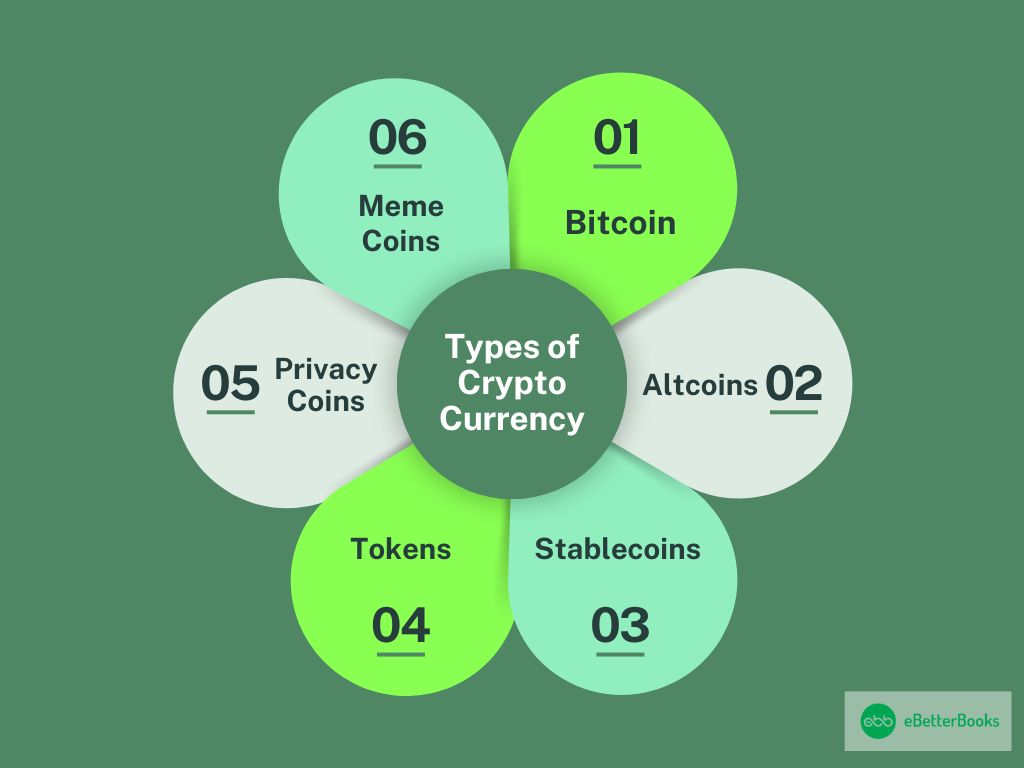What is Cryptocurrency?
Cryptocurrency is money that is exchanged electronically or over the Internet and is highly secured by cryptography to prevent fraud and duplication. While central authorities issue traditional money, cryptocurrencies are used in decentralized networks based on the blockchain.
A blockchain is the record of all activities within a network, in which all computations take place in a public database distributed among various computers. Cryptocurrencies include Bitcoins, Altcoins, Tokens, and Stablecoins. Cryptocurrencies involve using these different currencies to complete transactions directly with another party without the involvement of a third party, such as a bank, making transactions faster and potentially cheaper.
Holders of cryptocurrencies use digital wallets, which are equipped with specific public and private keys to facilitate safe purchases. Cryptocurrencies decentralize the client’s assets, making it very difficult for any unscrupulous person to manipulate or defraud the client. However, such a market is very sensitive, and prices change very sharply from time to time.
Types of Cryptocurrency

1. Bitcoin (BTC)
Bitcoin was created in 2009 by an enigmatic person or group, Satoshi Nakamoto, and is the fundamental form of digital currency; thus, people can transact with each other through the use of the currency without necessarily involving third parties such as banks. Read more about Proof of Work Systems, a key technology behind Bitcoin.
Originally known as a digital currency or even Internet money, Bitcoin is widely used as a digital asset and a means of payment. It has a limited circulation, with a set maximum number of 21 million pieces.
2. Altcoins
All digital currencies except for Bitcoin are known as altcoins, the concept of which is to build upon Bitcoin either in terms of technology and/or added use cases. For example, there is Ethereum, which provides the operation of smart contracts and various applications, and Litecoin, which aims to increase the speed of transactions. There are numerous differences between altcoins and original bitcoins, ranging from faster transaction clearing to the creation of new services in the sphere of finance. Thus, the crypto-square has become more diverse.
3. Stablecoins
Stablecoins may be defined as cryptocurrencies whose prices are anchored on one or a basket of assets such as foreign currencies or precious metals. These are, for instance, Tether (USDT) and USD Coin (USDC) because they offer less risky investments to buy, sell, and use in the cryptocurrency market. They are used especially in exchanges for fast conversion of fickle assets into a more stable digital currency.
4. Tokens
Tokens are related to final goods, services, or securities or are considered utilities based on the given blockchain platforms and more frequently originate from smart contracts primarily on Ethereum. While coins serve as their independent currency, tokens have other uses, such as providing an entry into DeFi platform games or buying an NFT. Some examples are Chainlink (LINK), which sources real-world data for smart contracts, and Uniswap (UNI), which is used in governance on its decentralized exchange platform, Explore more about Non-Fungible Tokens (NFTs).
5. Privacy Coins
Privacy coins are basically blockchain-based coins designed to work specifically on the issue of increasing transaction anonymity and user identity. Unlike the Bitcoin ledger, which makes every transaction that has taken place transparent, there are privacy coins like Monero (XMR) and Zcash (ZEC), which, through the use of cryptography to conceal the information in a transaction, including the transaction origin and the destination. These coins go well with those who are extremely shy with their identities in the online marketplace.
6. Meme Coins
Meme Coins are coins that are created as a mere joke or as a result of a meme, but with lots of support from the communities and social media. Some of these are the Dogecoin (DOGE), which was created as a satire of Bitcoin, and the Shiba Inu (SHIB), which was named after a dog breed of dogs; these have received massive coverage in the market and have been boosted by celebrities and groups online instead of having unique functions.
Why do people invest in cryptocurrencies?
People invest in cryptocurrencies with the hope that their value will increase over time, allowing them to make a profit. As demand for cryptocurrencies like Bitcoin or Ethereum grows, their prices may rise, providing investors with the opportunity to sell at a higher value than what they initially paid.
- Potential for Profit:
Investors hope that the value of cryptocurrencies will increase over time, allowing them to sell for a profit. The more demand for a currency like Bitcoin grows, the higher its value may rise. - Supply and Demand:
For example, if Bitcoin becomes widely used for payments, the demand would increase, leading to a potential rise in price. Buying early could result in selling later at a higher value. - Ethereum’s Use Case:
Ethereum’s cryptocurrency, Ether, is used to run financial applications on its blockchain. As more applications are built, the demand for Ether grows, potentially increasing its value. - Bitcoin as a New Monetary System:
Some people view Bitcoin not just as an investment, but as a revolutionary form of money. For these enthusiasts, Bitcoin isn’t meant to be measured in dollars but in the value it offers as a decentralized monetary system. - Investment or Payment:
While many see cryptocurrencies as investments, others see them as a more efficient alternative to traditional currencies, wanting to use Bitcoin for everyday transactions rather than holding it for profit.
Bitcoin: A Special Mention
Introduction to Bitcoin
Bitcoin is the oldest and most famous cryptocurrency; many people call it the flagship of virtual currencies. Founded in 2009, Bitcoin explains the concept of decentralized finance, as transactions can occur between people anywhere in the world without the intervention of financial institutions. Read more about Proof of Work Systems, a key technology behind Bitcoin.
How Bitcoin Works
This disrupts traditional ordering using its blockchain technology to make all orders available on a public, non-editable ledger by a network’s computers (nodes). This decentralized system reduces the requirement for a third party through which value can be transferred directly.
Scarcity and Value
Similar to other commodities or financial assets, Bitcoin’s supply is limited to 21 million coins. Thus, the crypto-asset became popular as a long-term store of value, or “digital gold.” Their use is limited to make them scarce, and they can serve as a store of value against inflation. Learn more about Crypto Mining.
Market Influence and Adoption
Bitcoin is currently the most expensive digital currency, with significantly more value than anything else in terms of market capitalization and demand from users, merchants, governments, and hackers. It is often used to measure the state of the cryptocurrency market, and its use in payment is increasingly being adopted, making it the most widely used virtual currency in the world.
Technologies Involved in Cryptocurrency
Cryptocurrencies rely on several key technologies to function securely and efficiently:
Blockchain Technology
Cryptocurrencies are based on decentralized ledger technology known as the blockchain, which is an electronic record-keeping system that incorporates a network of computers (nodes) to record all transactions. Every transaction is added to a “block” and then linked to the previous block, hence the name “chain.” It also makes hacking almost impossible because any change made to any of the blocks will affect all the subsequent blocks on the structure of the data held. Even if the representatives of the blockchain do not have a central physical location, there is no possibility of a single point of failure.
Cryptography
Cryptography encrypts digital information used in Cryptocurrency transactions. It employs synchronization methods for algebraic calculations to encode and decode details such as user identities and transactions. Public and private keys are the main components of cryptographic technologies applied to cryptographic communication used to transact cryptocurrencies. While the public key is more like an account number through which funds can be sent, the private key is like the pin used to authorize the movement of funds.
Decentralized Ledger
The widely used structure of blockchain is a distributed ledger maintained by a number of nodes that perform operations validation. Major entities like banks are required to regulate the use of personal contracts, which helps the system become hack-free and fail-proof. This is where consensus mechanisms, such as Proof of Work and Proof of Stake, assist nodes in agreeing to the validity of the transaction.
Smart Contracts
Some cryptocurrencies, such as Ethereum, can support the use of smart contracts, which are digital agreements whose provisions are coded and automatically executed themselves. They execute the conditions of the agreement once a certain criterion reaches the set standard; thus, various decentralized applications (dApps) and transactions operate and come into effect.

These technologies collectively provide the twin features that make cryptocurrencies safe and decentralized, making them usable as digital currency and for many other purposes.
How Cryptocurrency Works?
Cryptocurrency involves the use of already defined blockchain, cryptography, and other decentralized systems that enable safe transactions between individuals without involving the use of middle agents such as banking systems.
Here’s a breakdown of how cryptocurrency works:
Blockchain Technology
The blockchain is the innermost framework of many cryptocurrencies. It is a distributed electronic record-keeping system that updates transaction data in computers around a network known as nodes. In each transaction, the records are bundled together in a ‘block.’ The block is then linked to the other existing blocks to create a sequential, unalterable series—the chain.
Transactions and Wallets
Payments are performed through digital wallets, which develop applications containing users’ public and private keys. The public key is a current account number that can be used to receive funds, and the private key is a PIN that allows the user to spend the cryptocurrencies. During the transaction process, the user signs in with their private key to confirm his or her identity and authorize the transfer of money.
Consensus Mechanisms
In order to introduce a new block in the blockchain of linked blocks, the nodes in the network have to come to a consensus on the authenticity of the various transactions of the given block. Various consensus techniques exist to be used in totally different cryptocurrencies. For instance, Bitcoin utilizes Proof of Work (PoW) which employs miners who solve very complicated quadratic equations in an attempt to validate numerous transactions to form new blocks.
Mining and Validation
In PoW systems, miners utilize powerful systems for solving complex algorithms solving them in order to validate transactions. When a miner successfully solves a puzzle, the new block is added to the blockchain, and as a reward, they earn newly created cryptocurrency and transaction charges. This process is called mining. In the PoS systems, new blocks are created by the validators who have more stakes in the network, thereby making it a low-power consumption approach.
Security and Anonymity
Cryptocurrencies can be said to be safe due to cryptographic methods used to prevent the identification of the currency owners and further details of the transactions carried out. As the transactions happen, they are stored on the blockchain, which is easily accessible, but the use of public keys connotes some form of anonymity. To illustrate, Monero and Zcash subvert the general transaction details even more from the view of the public.
Decentralization
High decentralization is actually one of the primary properties of cryptocurrency. Cryptocurrency is different from central bank-controlled money as it is built on a decentralized system of nodes that make up the blockchain. This minimizes the chances of user accounts being manipulated, faked, or censored while giving users consolidated control over their digital property.

What is a Crypto Wallet?
A crypto wallet a digital technology that enables one to effectively access and transact virtual currencies while preventing unauthorized access to the money he or she is transacting with. It does not contain the actual money but keeps the compulsory public and private keys, which help to access and control the money in the blockchain.
The public key works more or less as an address through which other individuals can transfer digital currency to the wallet. In contrast, the private key works similarly to a password by confirming transactions. The security of the private key is of the utmost importance, for it is the key and holder of the wallet and has full control over the funds within the wallet.
Crypto wallets come in two main types:
Hot Wallets
These types are always connected to the internet, like mobile applications or web wallets, and facilitate easy transactions. However, they also expose users to hacking.
Cold Wallets
These wallets, such as hardware wallets or paper wallets, are cold and are not targeted by hackers. They are also not easily accessible.
Wallets can serve multiple digital currencies and can be further supplemented with other functionalities, including trading. On balance, crypto wallets are mandatory for individuals engaged in operations with digital currency, as well as for those who want to store their crypto funds securely.
What is a Crypto ATM?
A Crypto ATM is a machine that enables customers to purchase cryptocurrencies supported by BTC, including bitcoin, and it also supports the selling of the BTC backed by the cashier’s cash or debit card. While normal ATMs are linked to accounts, the crypto one is connected to a cryptocurrency exchange, making the buying or selling process easier. They may deposit cash in order to buy cryptocurrency and have it delivered to their wallet or may use the same machine to exchange cryptocurrency for cash.
Popular Locations for Crypto ATMs:

United States
The US has the most of them worldwide, and specific locations include Los Angeles, New York, Miami, and Chicago. These machines are usually in convenience stores, some malls, and sometimes in some airports.
Canada
Canadians can pay with cryptocurrencies at 15+ crypto ATMs operating in the country, thanks to the company’s early decision to expand the service to Canada and invest in cities such as Toronto, Vancouver, and Montreal.
United Kingdom
The United Kingdom has the highest number of crypto ATMs in Europe. Machines are available as point-of-sale systems in stores and terminals within transport stations in London and other cities.
Australia
Sydney and Melbourne, among other cities in the country, have coin-accepting machines for cryptocurrencies to meet the increasing demand for digital currency.
El Salvador
After the government legalized Bitcoin, many crypto ATMs were erected across the nation, enabling both inhabitants and visitors to withdraw crypto coins.
These places make crypto ATMs available for people who would rather pay cash for their crypto business.
What are Crypto Exchanges
Crypto exchanges are online marketplaces that allow buyers and sellers to exchange, buy, and sell various cryptocurrencies. They also serve as agents that help connect the buyer to the seller. Also, buyers are allowed to exchange one type of cryptocurrency for another (peer-to-peer or P2P trading) or to exchange cryptocurrencies for traditional currencies like Dollars or Euros, respectively, known as seeding. There tend to be charges levied depending on the exchange and the transaction that takes place, and there could be extra services such as wallets, staking, and margin. Learn more about the Types of Cryptocurrency Exchanges.
There are two main types of exchanges:
Centralized Exchanges (CEX)
These exchanges are operated by companies that act as brokers and intermediate trading sessions for users. They are easier to use and have high liquidity, but in order to trade on them, the user has to rely on a platform with his/her money.
Decentralized Exchanges (DEX)
They are decentralized and peer-to-peer, enabling the execution of contracts between individuals. They have great privacy, but the volume can be less, and they can be more difficult for the novice to understand.
Famous Crypto Exchanges:
Binance
Binance is the largest global platform for trading digital assets, with the biggest trading volume and diversified tools for crypto trading.
Coinbase
It is a Windows-based operating system, mostly found in the U.S. Because of its ease of use, it has garnered many sales and is compliant with legal requirements.
Kraken
It provides a wide choice of electronic commerce and is known for its high levels of security.
Bitfinex
Reputed for offering highly flexible trading capabilities, specifically margin trading.
Gemini
It is an American exchange initiated by the Winklevoss brothers, and it has quite strict regulations and security measures.
Uniswap
It is a premier DEX based on the Ethereum Network that connects buyers and sellers of tokens directly.

How Do Cryptocurrency Exchanges Work?
A cryptocurrency exchange is an online platform where users can buy, sell, and trade cryptocurrencies like Bitcoin using various currencies, including fiat money (USD, EUR) or other altcoins. These exchanges act as intermediaries, connecting buyers and sellers in a secure and efficient environment.
To use an exchange, traders need to create an account, deposit funds, and then place buy or sell orders. Once orders match, transactions are executed, and cryptocurrencies are transferred between users.
Exchanges typically charge fees for transactions and may offer additional services like wallets, staking, or trading tools. There are two main types of exchanges:
- Centralized Exchanges (CEX): Managed by companies that handle transactions and security.
- Decentralized Exchanges (DEX): Allow direct peer-to-peer trading without an intermediary.
In summary, cryptocurrency exchanges simplify the process of trading digital assets by providing a marketplace for secure and transparent transactions.
Conclusion
Cryptocurrency represents a new financial order built on blockchain technology, reducing transaction costs and increasing efficiency. To fully unlock its potential, understanding how to invest in cryptocurrency and associated technologies is essential.
FAQs
What is the main Difference Between Bitcoin and other Cryptocurrencies?
Bitcoin is the first and most well-known cryptocurrency, often referred to as “digital gold.” Other cryptocurrencies, such as altcoins or tokens, offer different functionalities and use cases, often with added features like faster transactions or smart contracts.
How do Cryptocurrency Wallets Work?
Cryptocurrency wallets store the keys that allow access to your crypto funds. A public key acts like an address, while the private key is used to authorize transactions. Securing your private key is crucial for protecting your assets.
What is the Role of Cryptocurrency Exchanges?
Cryptocurrency exchanges act as platforms where you can buy, sell, or trade cryptocurrencies. They connect buyers and sellers, offering various services, including wallet support, trading tools, and options for converting cryptocurrencies to fiat money or other cryptos.

